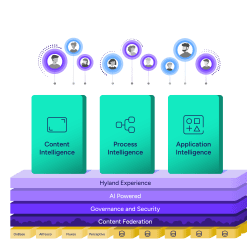Horry County
Local government agency uses Hyland RPA to process 30,000 property tax returns without human interaction.

Harness the power of a unified content, process and application intelligence platform to unlock the value of enterprise content.
Learn more
Explore Hyland’s solutions by industry, department or the service you need.
Overview of solutionsIt's your unique digital evolution … but you don't have to face it alone. We understand the landscape of your industry and the unique needs of the people you serve.
 Overview of industries
Overview of industries
Countless teams and departments have transformed the way they work in accounting, HR, legal and more with Hyland solutions.
 Overview of departments
Overview of departments
We are committed to helping you maximize your technology investment so you can best serve your customers.
 Overview of services
Overview of services

Discover why Hyland is trusted by thousands of organizations worldwide.
Hear from our customers
Our exclusive partner programs combine our strengths with yours to create better experiences through content services.
Overview of partners
Find resources to power your organization's digital transformation.
Browse the resource center
Hyland connects your content and systems so you can forge stronger connections with the people who matter most.
Learn about HylandWith our modern, open and cloud-native platforms, you can build strong connections and keep evolving.
 Dig deeper
Dig deeper
Reading time minutes
Local government agency uses Hyland RPA to process 30,000 property tax returns without human interaction.

Like many local government agencies, the Horry County Auditor’s Office was no stranger to processing large volumes of data. And like many local government agencies, this meant working with a mix of paper and digital documents, and relying on limited staff to manually extract, verify and key in important data across multiple disconnected applications.
Each year, the auditor’s office received more than 90,000 personal property tax returns — and it took the staff of six almost six months to complete them. The manual effort required for this process tied up the limited workforce for half of the year, keeping them from other important tasks.
The auditor’s office determined they needed to modernize this process. They worked with Horry County IT/GIS to reduce the volume of paper records by implementing OnBase Unity Forms for electronic tax form submission and OnBase Advanced Capture for digitization of paper forms.
The timing of the digitization project proved to be just right, as over the next two years, the COVID-19 pandemic further impacted the resources available for manual processing due to staff working remotely with limited access to the office. Still, there was an opportunity for additional modernization.
While reducing the volume of paper records helped, much of the process remained mostly manual. The county needed process automation, but this was proving to be a challenge because the QS/1 tax processing software used by the county auditor’s office had no APIs or other means of integration with line-of-business applications, including Hyland's OnBase.
— Timothy Oliver, CIO, Horry County
This is when the Horry County IT/GIS department decided to give robotic process automation (RPA) a try, said Timothy Oliver, Horry County CIO. RPA is often a good fit for repetitive, manual data entry processes in which system integration is not an option. Having originally experimented with Blue Prism RPA, Horry County eventually settled on Hyland RPA due to its ease of use and better integration with OnBase.
The Horry County Auditor’s Office put RPA to work on automating the repetitive, tedious task of entering tax return data into their QS/1 application. As it performs its task, Hyland RPA uses conditional business rules to help it tackle any complexities. For example, if a constituent submitting a return claims a real estate property as their primary residence, Hyland RPA verifies this information against another line-of-business application — Aumentum — and then proceeds accordingly. Hyland RPA can even use rules to recognize when values submitted are likely erroneous or fraudulent and will then forward the flagged return for a human auditor to review.
In its first year of implementation, Hyland RPA successfully processed a third of the 90,000 returns without human interaction, which significantly unburdens auditor’s office staff and frees them up for higher-value work
Oliver acknowledges that configuring RPA business rules was a learning process. It’s not always easy to take years of human experience and translate them into repeatable logical rules RPA can follow. But the county’s investment of time in building and validating business rules paid off, reducing the number of errors and exceptions in the business process.
One unique benefit of Hyland RPA is that every action of the bot is logged, which enables easy troubleshooting during configuration. It also simplifies compliance initiatives by giving auditors access to every system interaction and change to tax files.
Hyland RPA has proven to be a capable helper as it has reduced the workload on human workers in the Horry County Auditor’s Office. But this is just the beginning, Oliver said.
RPA is a new tool in the IT/GIS department’s toolbox, and during project meetings, Oliver and his staff are often asked, “Can’t RPA do that?”